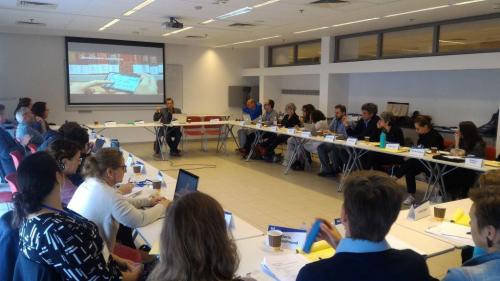EHRI Seminar in Jerusalem: A Discussion on Holocaust Testimonies in the Digital Age

EHRI Seminar "From the Living Room to the World-Wide Web: Documenting, Uploading and Utilizing Holocaust Testimonies in the Digital Age" Jerusalem, 11-15 November, 2018
Yad Vashem hosted a unique and innovative EHRI seminar dealing with the challenges involved in collecting, preserving, accessing and using testimonies of Holocaust survivors in the digital age. The EHRI seminar, held with the support and cooperation of the Foundation “Remembrance, Responsibility and Future” (EVZ) was organized by Yad Vashem's International Institute for Holocaust Research and the Archives Division.
Participants
Thirty-two participants from Israel and abroad – the US, France, Germany, Spain, Chile, Italy, Greece, the Czech Republic and Scotland – and more than 20 participants from Yad Vashem gathered at Yad Vashem to answer a variety of questions, including questions relating to a definition of Holocaust testimony; the knowledge of and accessibility to Holocaust testimonies that have been gathered over the years worldwide; the connection between the testimonies of survivors, rescuers and eyewitnesses; and the ethics of the use and presentation of testimonies in the various media for different goals, such as research, commemoration and education on both the personal and wider levels.
Topics
Other topics that arose encompassed:
- To what extent are testimonies still being collected in Israel and abroad and how will conducting these kinds of interviews look in the coming years?
- How is it possible to categorize and make the evidence available in a way that is relevant to different users?
- What new technologies and platforms are available?
- How may we best create and monitor the necessary interaction between the collections and users of the testimonies?
- In what ways may we draw on testimonies in the struggle against Holocaust denial and antisemitism in the real world, online, and more?
Working meeting
The five-day seminar featured a working meeting of the directors of institutions that hold some of the largest collections of testimonies of Holocaust survivors: Yad Vashem in Jerusalem, the USC Shoah Foundation in California, the United States Holocaust Memorial Museum (USHMM) in Washington, the Fortunoff Collection at Yale University, the Mémorial de la Shoah in Paris, and the International Tracing Service in Bad Arolsen. Part of the seminar was devoted to cooperation in the future programs of each organization, mapping the common challenges, and trying to find shared solutions.
Local collections
In addition to representatives of the large collections, the seminar also attracted managers of smaller, local collections, each of them comprising dozens and even hundreds or thousands of testimonies, such as representatives of the Ghetto Fighters House in Israel, and managers of testimony collections in Germany, Scotland, New York, Greece, the Czech Republic and even Chile. This encounter with deeply dedicated local activity – limited in scope and often without many resources – was fascinating and thought provoking.
Users
Alongside the collection managers, a large group of "users" participated in the seminar. Researchers from different disciplines, such as historians, sociologists, psychologists and psychotherapists joined the discussions, as well as media experts, educators, genealogists, and even family-research experts. Towards the end of the seminar, three Holocaust survivors were invited to talk about their motivation to testify, and especially about their feelings regarding the fact that their testimonies are in the public domain.
"This unique seminar enabled us to map a range of relevant topics, to sharpen directions of thought, to listen and to talk," said Yad Vashem Archives Director and Fred Hillman Chair for Holocaust Documentation Dr. Haim Gertner. "Most importantly, it allowed us to deepen and expand the global network of experts, and even to create directions for practical projects and collaborations in the near future."
Image: Seminar at Yad Vashem
